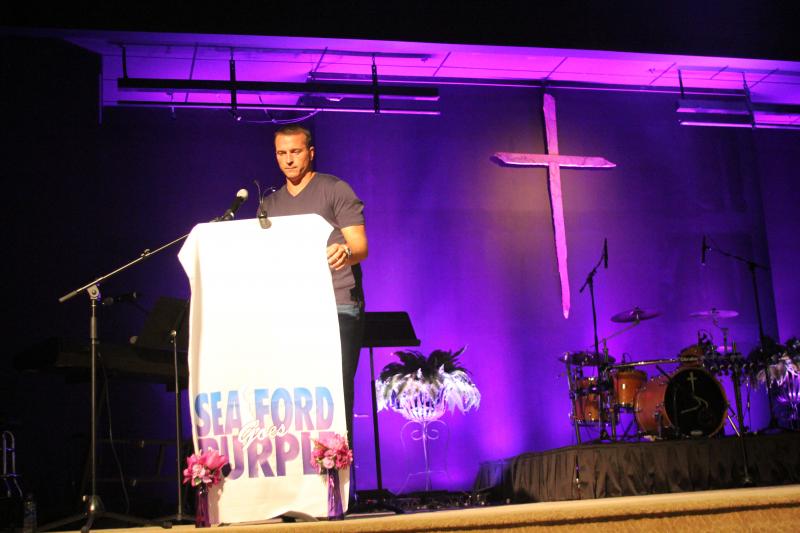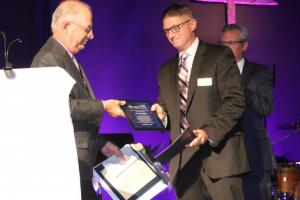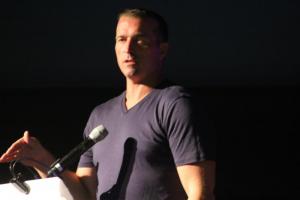Former NBA player and now opioid recovery advocate Chris Herren told a crowd Sept. 11 how he went from an elite athlete to a drug user chasing death.
“We wake up every morning chasing death,” he told about 700 people at the Crossroad Community Church in Georgetown.
Herren was the key speaker of the Sussex Goes Purple kickoff – an initiative based on Herren's own Project Purple, which he established to bring awareness to substance abuse and encourage positive decision-making in life.
Herren shared his story of growing up in Massachusetts south of Boston where he earned success as a high school basketball player and became a top college recruit. Staying close to home at Boston College, he was among the top recruited freshmen that year alongside Allen Iverson and Ray Allen.
He also started doing cocaine. “I had no idea one line would take 14 years to conquer,” he said.
Drug use cost him a college career at Boston College, he said, but coach Jerry Tarkanian gave him a second chance at Fresno State. Cocaine use followed him to the West Coast, and after a short stint in rehab he finished his senior year as the number 33 pick in the NBA draft. He was picked by the Denver Nuggets, and stayed clean only because the coach and players watched him like a hawk, he said.
“My rookie season was my best season,” he said.
At the start of his second NBA year, Herren returned to training camp addicted to OxyContin but was traded early on to the Boston Celtics. Returning to Boston, he recalled missing warmups on what should have been the biggest night of his career – starting as a point guard for his hometown team. Instead of enjoying the spotlight, he said, he stood outside the Boston stadium waiting for his drug dealer to deliver him oxycodone. The Celtics waived him soon after.
At 24, Herren said, he went to Italy to play basketball, but again was sidetracked by drugs, this time heroin.
Now a heroin addict, he said, the drug consumed him until he no longer wanted to play basketball. He, his wife and two young kids returned to Massachusetts where his legal troubles began. A morning trip to Dunkin' Donuts turned into his first overdose after he crashed his car. He briefly went to jail, but when he got out, he said, he could only think about finding his drug dealer and getting his next fix. “What he sold me was so good it almost killed me,” he said.
His fatalism continued into his 30s as he became a street junkie, fell in love with vodka and let down his family. About a month before the birth of his third child, he said, a friend finally convinced him to go to rehab. But even the birth of his son didn't cure him. It was only after a counselor told him that his children should be told their father is dead that he realized he had to change.
“In 2008, I hit my knees and started praying,” he said.
Herren's story resonated with the Sussex County crowd.
Sussex County Council President Mike Vincent said opioid use is an epidemic that is hitting the county hard. Last year, he said, paramedics administered Narcan, the overdose-reversing drug, 570 times to 400 individuals. Statewide in 2017, those numbers increased to 2,714 Narcan administrations for 1,906 patients.
“Paramedics tell me there are times on the street in a 12-hour shift, they will give Narcan to the same person twice,” Vincent said. “They will take them to the hospital, leave, go home and again will take them to the hospital. This is past serious.”
The same day as Herren's presentation, state officials released suspected overdose numbers for August. There were 39 suspected overdoses for the month, exceeding the previous monthly record of 27 overdoses set in April 2018, according to the Delaware Department of Health and Social Services. There were no details on the suspected substances on the overdoses other than assuming fentanyl is being used, officials said.
To bring awareness to the epidemic, officials encouraged participants to sponsor events such as 5Ks and informational talks. Forming a Purple Club with Purple Ambassadors is suggested for schoolchildren, and municipalities are encouraged to hang purple banners, purple lights and even turn water fountains purple.
“Intervention and prevention needs to start young with our kids,” said Peggy Geisler, executive director of the Sussex County Health Coalition. “We see those kids every day at the Sussex County Health Coalition. Those kids are not being fed, they have trauma, mental health, anxiety … we need to have a candid conversation. People need to tell their story. They need to share what's going on.”


























































